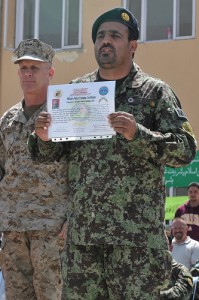Baby-Sitting Terrorists Rather Than Tracking Osama Bin Laden
A few comments from Mary got me thinking about how damning today’s AP story on our Romanian black site is for the torture apologists’ tale that torture–and CIA interrogations more generally–helped find Osama bin Laden.
The AP’s story reminds readers that Abu Faraj al-Libi, who was first captured on May 2, 2005, provided information about Abu Ahmed al-Kuwaiti. The suggestion is that al-Libi provided the information while in Romania.
A deceptive Al-Libi, who was taken to the prison in June 2005, provided information that would later help the CIA identify Osama bin Laden’s trusted courier, a man who unwittingly led the CIA to bin Laden himself.
Al-Libi’s Gitmo file reports that the Pakistanis transferred him to US custody on June 6, 2005, so assuming the two 2005 cables reporting on al-Kuwaiti, whom the report calls Maulawi Abd al-Khaliq Jan, were written while he was officially in US custody, then that would clearly be the case.
So al-Libi was doused while in Romania, which led him to describe that he was “responsible for facilitation within the settled areas of Pakistan, communication with UBL
and external links” and “responsible for communicating with al-Qaida members abroad and obtaining funds and personnel from those al-Qaida members.” He said he accomplished his communication with OBL via a courier he called Abd al-Khaliq. And the CIA’s response to that information was … to stop looking for OBL.
But here’s what’s really curious about the story.
As the AP story makes clear, sitting just one cell over in the prison in which al-Libi apparently provided that information was one of the other guys who, the CIA says, gave information on al-Kuwaiti: Khalid Sheikh Mohammed.
There it held al-Qaida operatives Khalid Sheikh Mohammed, the mastermind of the Sept. 11, 2001 attacks, and others in a basement prison before they were ultimately transferred to Guantanamo Bay, Cuba, in 2006, according to former U.S. intelligence officials familiar with the location and inner workings of the prison.
[snip]
Flight records for a Boeing 737 known to be used by the CIA showed a flight from Poland to Bucharest in September 2003. Among the prisoners on board, according to former CIA officials, were Mohammed and Walid bin Attash, who has been implicated in the bombing of the USS Cole.
While it’s not critical to this post, it is sort of curious that KSM reportedly provided information on al-Kuwaiti in Fall 2003–so probably not until he got moved to Romania. Maybe the springs in the floors made it easy to talk about OBL’s couriers?
So in spite of the fact that al-Libi was talking about someone who was a KSM protégé in the very same prison where the CIA still held KSM, no one thought to cross-check this information with KSM?
Nope. You see, the CIA considered itself to be babysitting KSM. His intelligence value had diminished, they say.
One former officer complained that the CIA spent most of its time baby-sitting detainees like Binalshibh and Mohammed whose intelligence value diminished as the years passed.
One more note on this. Al-Libi and KSM were setting in the same prison actively hiding details about al-Kuwaiti after the time Hassan Ghul had already told us how important al-Kuwaiti was, as described in this earlier Goldman and Apuzzo piece.
Then in 2004, top al-Qaida operative Hassan Ghul was captured in Iraq. Ghul told the CIA that al-Kuwaiti was a courier, someone crucial to the terrorist organization. In particular, Ghul said, the courier was close to Faraj al-Libi, who replaced Mohammed as al-Qaida’s operational commander. It was a key break in the hunt for in bin Laden’s personal courier.
In fact, Ghul was apparently himself in Eastern Europe at the time (though it sounds like the Romanian prison had five of six cells accounted for at that point).
You’d think the CIA might have asked all of these guys about this courier, as they were all in our custody in Eastern European prisons at the time, at least two of them in the same place.
But apparently the CIA was too busy babysitting.

